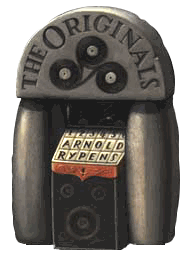WE WILL OVERCOME
Created on 20/04/2005Latest update on 26/10/2023
Artist: Lucille Simmons
Author: traditional
Year: 1946
Employee of the American Tobacco Company in Charleston, South Carolina on strike. She sang on the picket line to keep spirits high, substituting the word "I" into "we" in Albert Tindley's hymn I'll Overcome Someday. One of the reasons We Will/Shall Overcome became such a massive folk chant was that melody and part of the lyrics already circulated. The opening lines came out of O Sanctissima (Cicilian Mariners' Hymn, also known as I'll Be All Right), while the words came from Rev. Albert Tindley's I'll Overcome Someday. Tindley was a Philadelphia methodist who also wrote Stand By Me and who first published it in 1901 (in C. Austin Miles' New Songs Of The Gospel; the same Miles who wrote gospel hymn In The Garden). We Shall Overcome's success in de sixties inspired Tindley's heirs to start up their own Soul Echoes Publishing Company in that same Philadelphia. If they actually got royalties for We Shall Overcome would prove that all great folklore of the world is just a vulgarised misinterpretation of the culture of the upper class. And there are many folklorists who believe that, because the upper class folklore was documented and printed and the lower class folklore was not. Scholars can show you that all great folklore of Europe came down from imitations from upper class. Allow Alan Lomax to laugh it away. He who spent months and months in places like Haiti, where whole communities are making whole new cultures all by themselves and nobody can even write down their language much less. And this has been going on for a hundred thousand years before print was even thought of. To make a long story short: all ends well. Royalties for We Shall Overcome don't flee in Tindley's heirs' pockets, nor do they end up on anyone else's bank account. Luckily Pete Seeger, Guy Carawan and Frank Hamilton secured that all We Shall Overcome revenues spice a scholarship fund for talented young Afro-Americans exclusively.
Covers:
- 1950:
Joe Glazer & The Elm City Four [on Eight New Songs For Labor for the C.I.O.; sang it since '47 for textile workers]
- 1952:
Jewish Young Singers [als We Shall Overcome; soloist: Laura Duncan on Hootenany Records, reissued on Folkways in \'63 (album Sing Out! Hootenany)]
- 1957:
Zylphia Horton [tape recording]
- 1959:
Charlton Heston & the Robert DeCormier Chorale [on lp Charlton Heston Reads 'Out Of Egypt']
- 1960:
Guy Carawan [during the founding convention of the Student Non-violent Coordinating Committee (SNCC) in Raleigh, NC; that was the basic platform for all sixties protest movements; he also sang it on Newport Folk]
- 1961:
Rev. Gary Davis [as I'll Be All Right]
- 1962:
Pete Seeger [as We Shall Overcome; substituting 'down in my heart' for 'deep in my heart'; Pete holds a Harvard degree]
- 1962:
Joan Baez [idem; hit US, recorded in Birmingham, AL, in '63 at Lincoln Memorial in Washington, D.C. and in '69 at Woodstock]
- 1962:
Dr. Martin Luther King [as a speech on PICA lp At Zion Hill; learned it from Pete Seeger at the Highlander center in Tennessee (see footnote)]
- 1962:
- 1963:
Mahalia Jackson [as We Shall Overcome]
- 1963:
Freedom Singers [idem at Newport]
- 1964:
- 1964:
- 1966:
Laurel Aitken [reggae version]
- 1966:
Stranger Cole [idem]
- 1968:
Maytals [reggae version following the murder of Dr. King]
- 1968:
- 1968:
- 1968:
Liz Lands [for Gordy, recorded in '63]
- 1969:
Charlie Haden Liberation Orch. [in Circus '68-'69 reaction upon the chaos during the Democratic Party Convention in Chicago in '68]
- 1970:
Louis Armstrong [his last recording]
- 1974:
Solomon Burke [in medley with Precious Lord, Take My Hand on lp I Have A Dream]
- 1979:
Mike Bloomfield & Woody Harris [as I'll Overcome in documentary And This Is Free, dealing with blues and gospel in Chicago]
- 1985:
Green On Red [as We Shall Overcome]
- 1993:
Peter, Paul & Mary [idem]
- 1998:
Bruce Springsteen [on Where Have All The Flowers Gone and in '06 on the Seeger Sessions]
- 2004:
- 2010:
Preservation Hall Jazz Band [vocal: Pete Seeger and Tao Rodriguez-Seeger]
- 2010:
- 2014:
Jan Rot [as Wij Zijn Overal]
- 2016:
Eric Clapton [as I'll Be Alright]
- 2020:
- 2020:
"The song was really popularized by two people, Zylphia Horton, who was an amazing backwoods girl who married Myles Horton. Now Myles is one of the most remarkable people of the 20th century. He decided that you could sell anything by discussing it and he learned how to run discussion groups everywhere and he built a central Highlander Folk School in the Appalachians (Grundy County, TN) where he brought people together to discuss their fate. He didn't tell them what to think, they told each other what they decided and this center is where the Union Movement in the south began, where the Voters Registration Movement in the south began. Rosa Parks, the black lady who somewhat singlehandedly started the whole Civil Rights Movement by refusing to give up her seat on a segregated bus in downtown Montgomery, AL in 1955, was formed at Highlander. Goes to show. Myles was a remarkable fellow. He married Zylphia and she was interested in music. She collected songs and introduced those to the movement. When she heard one of these tobacco strikers sing the I'll Overcome Someday hymn in plural, she immediately understood its militant potentiality and contacted Guy Carawan. Guy, a Welshman and Zylphia's successor as music teacher at the Highlander School, began to work in the integration movement very early, before anybody else, understanding these people needed music, especially their own music. Understanding We Will/Shall Overcome had become a black interpretation of a white hymn, he was the person really who introduced the plural form to the masses. Guy hereby did the most graceful thing: he pulled back and left it to them. In the end they were so full of it they almost forgot Guy Carawan had ever been there in the first place. By the time We Shall Overcome became like the folk warhorse we know, Guy and his wife retired to John's Island off the coast in South Carolina and lived among the last surviving slave descendents, related to them and recorded them in and around their slave house of prayer, still there. Some of these people became leaders in the Voters Registration Movement in South Carolina, which was the first place that blacks actually won an election. Guy is the person who exhausted himself in this struggle more than all of the rest of the Civil Rights Movement people. Pete Seeger was touring the world but Guy was the man who was right there at the face of things. His books are there to prove it." (Alan Lomax in an interview with the author - April 1994, Hunter College NYC).


